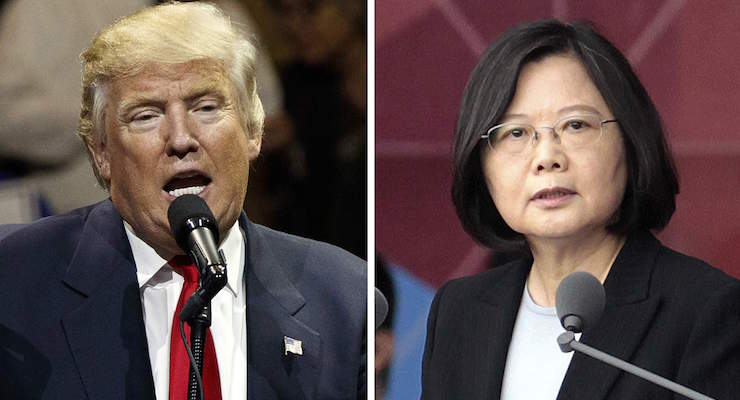

FILE – This combination of two photos shows U.S. President-elect Donald Trump, left, speaking during a “USA Thank You” tour event in Cincinatti Thursday, Dec. 1, 2016, and Taiwan’s President Tsai Ing-wen, delivering a speech during National Day celebrations in Taipei, Taiwan, Monday, Oct. 10, 2016. Trump spoke Friday, Dec. 2, with Tsai, a move that will be sure to anger China. (Photo: AP, File)
Like a bolt of lightning, that call of congratulations from Taiwan President Tsai Ing-wen to President-elect Donald Trump illuminated the Asian landscape.
We can see clearly now the profit and loss statement from more than three decades of accommodating and appeasing China, since Richard Nixon and Henry Kissinger made their historic journey in 1972.
What are the gains and losses?
Soon after Nixon announced the trip in July 1971, our World War II ally, the Republic of China on Taiwan, was expelled from the UN, its permanent seat on the Security Council given to the People’s Republic of China’s Chairman Mao, a rival of Stalin’s in mass murder.
In 1979, Jimmy Carter recognized the regime in Beijing, cut ties to Taipei and terminated the Sino-American Mutual Defense Treaty of 1954. All over the world countries followed our lead, shut down Taiwan’s embassies, and expelled her diplomats. Our former allies have since been treated as global pariahs.
During the 1990s and into the new century, Republicans, acting on behalf of the U.S. Chamber of Commerce and Business Roundtable, voted annually to grant Most Favored Nation trade status for China. They then voted to make it permanent and escort China into the WTO.
What did China get out of the new U.S. policy? Vast investment and $4 trillion in trade surpluses at America’s expense over 25 years.
From the backward country mired in the madness of the Great Proletarian Cultural Revolution in 1972, China grew by double-digits yearly to become the foremost manufacturing nation on earth, and has used its immense earnings from trade to make itself a military power to rival the United States.
China now claims all the islands of the South China Sea, has begun converting reefs into military bases, targeted hundreds of missiles on Taiwan, claimed the Senkakus held by Japan, ordered U.S. warships out of the Taiwan Strait, brought down a U.S. EP-3 on Hainan island in 2001, and then demanded and got from Secretary of State Colin Powell an apology for violating Chinese airspace.
Beijing has manipulated her currency, demanded transfers of U.S. technology, and stolen much of what of U.S. did not cover.
For decades, China has declared a goal of driving the United States out beyond the second chain of islands off Asia, i.e., out of the Western Pacific and back to Guam, Hawaii and the West Coast.
During these same decades, some of us were asking insistently what we were getting in return.
Thus Trump’s phone call seemed the right signal to Beijing — while we recognize one China, we have millions of friends on Taiwan in whose future as a free people we retain an interest.
China bristled at Trump’s first communication between U.S. and Taiwanese leaders since 1979, with Beijing indicating that Trump’s failure to understand the Asian situation may explain the American’s gaffe.
Sunday, Vice President-elect Mike Pence assured us that nothing of significance should be read into the 15-minute phone call of congratulations.
Trump, however, was less polite and reassuring, giving Beijing the wet mitten across the face for its impertinence:
“Did China ask us if it was OK to devalue their currency (making it hard for our companies to compete), heavily tax our products going into their country (the U.S. doesn’t tax them) or to build a massive military complex in the middle of the South China Sea?”
Trump then answered his own question, “I don’t think so.”
According to The Washington Post, the phone call from Taiwan to Trump was no chance happening. It had been planned for weeks. And people in Trump’s inner circle are looking to closer ties to Taiwan and a tougher policy toward Beijing.
This suggests that Trump was aware there might be a sharp retort from Beijing, and that his tweets dismissing Chinese protests and doubling down on the Taiwan issue were both considered and deliberate.
Well, the fat is in the fire now.
Across Asia, every capital is waiting to see how Xi Jinping responds, for a matter of face would seem to be involved.
On the trade front, China is deeply vulnerable. U.S. tariffs on Chinese goods would cause a sudden massive loss of income to factories in China and a stampede out of the country to elsewhere in Asia by companies now producing in the Middle Kingdom.
On the other hand, without China using its economic leverage over North Korea, it is unlikely any sanctions the U.S. and its allies can impose will persuade Kim Jong Un to halt his nuclear weapons program.
China can choke North Korea to death. But China can also step back and let Pyongyang become a nuclear weapons state, though that could mean Seoul and Tokyo following suit, which would be intolerable to Beijing.
Before we go down this road, President-elect Trump and his foreign policy team ought to think through just where it leads — and where it might end.







JacksonPackson / December 7, 2016
@PPDNews What would Kelly mean for DHS? Why select him and not Kobach?
/
Rick Myles / December 7, 2016
Trump testing China & serving notice before they can test him. Brilliant move.
/